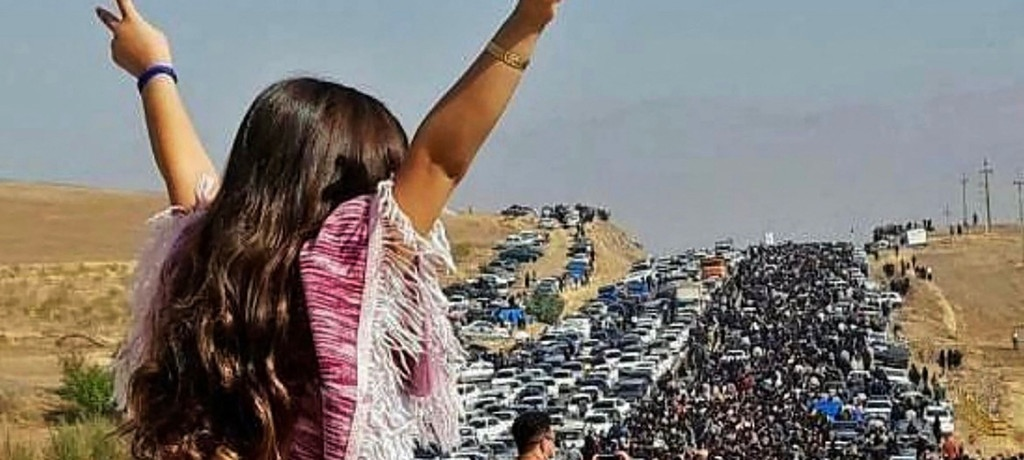 2022-11-10- The Guardian-by Golriz Ghahraman- Casting so many Iranians into exile is one of the worst acts of these terrorists masquerading as leaders. But it could also be their downfall
2022-11-10- The Guardian-by Golriz Ghahraman- Casting so many Iranians into exile is one of the worst acts of these terrorists masquerading as leaders. But it could also be their downfall
Being an Iranian woman is a heavy birthright. It comes with knowing a true, deep, feminism, while also knowing violent oppression at the hand of the government ruling our homeland.
My parents and I were granted political asylum in Aotearoa New Zealand when I was nine years old. We were never to return to Iran. Like most Iranian refugees, as long as the Islamic regime remains in power, our fear of persecution persists.
We have missed births and death of loved ones. But what the world has learned over the past 55 days of revolution in Iran is that exiled Iranians have never lost our fervent connection with the plight of our people back home.
I hope that sends a chill down the spine of the Iranian regime.
What is stunning is that our movement today is global, led by the breathtaking courage of protesters in Iran and amplified by Iranians around the world. None of us have slept a full night in these 55 days since the death of Mahsa Amini, the young Kurdish woman who died in the custody of “morality police” after being arrested under hijab laws. She became a symbol of our pain. Every one of us has known the violence of that regime. Every Iranian knows someone flogged, detained, tortured, or killed.
A protester in Tehran sets her veil on fire in clashes with police.
But oppression has never been an inherent part of Iranian culture. We know our rights. We know what democracy should look like. The Iranian revolution of 1979 was one of the biggest popular revolutions in living history because Iranians understood that the Shah’s secular dictatorship was never good enough. Our parents fought against inequality, and while their revolution was hijacked by a far more violent and oppressive dictatorship, they never stopped fighting back.
I was old enough when we left to still remember the hijab I had to wear to school, the terror my mother felt each time we left the house. Checking, double checking her covering. My mother has said since that she doesn’t understand how I leave the house without lipstick.
That was her suit of armour. For Iranian women, patriarchy told us to be colourless, shapeless, desexualised. Iranian women never stopped fighting that. The red lipstick wasn’t just about resisting Islamic dress, just as the protests in Iran now and in the green movement of 2009 are not only about the brutality of hijab enforcement. Feminism has become the frontline of Iranian resistance, for human rights, democracy, and regime change.
Last month in faraway New Zealand, we gathered at the Iranian embassy. We knew the ambassador was inside. We shouted chants: “We will fight, we will die, we will take back Iran.” We danced and sang about women’s rights. We held each other. Police officers dispatched to ensure public safety told us that the ambassador was inside, reporting a public disturbance. But protest is not illegal in Aotearoa.
The diaspora movement of Iranians has the power of freedom. We get to criticise our western governments for their inaction on Iranian human rights. In my case, I get to be elected to New Zealand’s parliament as the first ever refugee and a Middle Eastern woman. I get to meet with our minister of foreign affairs and our prime minister, to outline exactly what we need.
What we need is to freeze Iranian assets and bank accounts. Outlaw their funding mechanisms, designate them as terrorists known to be responsible for atrocities against our people. That must include the leaders of the Revolutionary Guard, who have tortured and killed with impunity for 43 years. We want the ambassador, that symbol of tyranny, expelled from his comfortable post in our adopted homeland. These are now some of the swiftly adopted, historically strong actions of many Western nations. This must in part be seen as a reflection of the diaspora movement.
The act of separating so many Iranians from our homeland is one of the worst impacts of this regime. But it could also be the vehicle for its downfall. We grew up with freedom, and we won’t rest until all of Iran is free.
Our booming chant will only get louder until that day, zan, zendegi, azadi. Women, life, freedom.
Golriz Ghahraman is a member of parliament for New Zealand’s Green party, and the country’s first refugee MP
… as you’re joining us today from Austria, we have a small favour to ask. Tens of millions have placed their trust in the Guardian’s fearless journalism since we started publishing 200 years ago, turning to us in moments of crisis, uncertainty, solidarity and hope. More than 1.5 million supporters, from 180 countries, now power us financially – keeping us open to all, and fiercely independent.
Unlike many others, the Guardian has no shareholders and no billionaire owner. Just the determination and passion to deliver high-impact global reporting, always free from commercial or political influence. Reporting like this is vital for democracy, for fairness and to demand better from the powerful.
And we provide all this for free, for everyone to read. We do this because we believe in information equality. Greater numbers of people can keep track of the events shaping our world, understand their impact on people and communities, and become inspired to take meaningful action. Millions can benefit from open access to quality, truthful news, regardless of their ability to pay for it.
Whether you give a little or a lot, your funding will power our reporting for the years to come.
